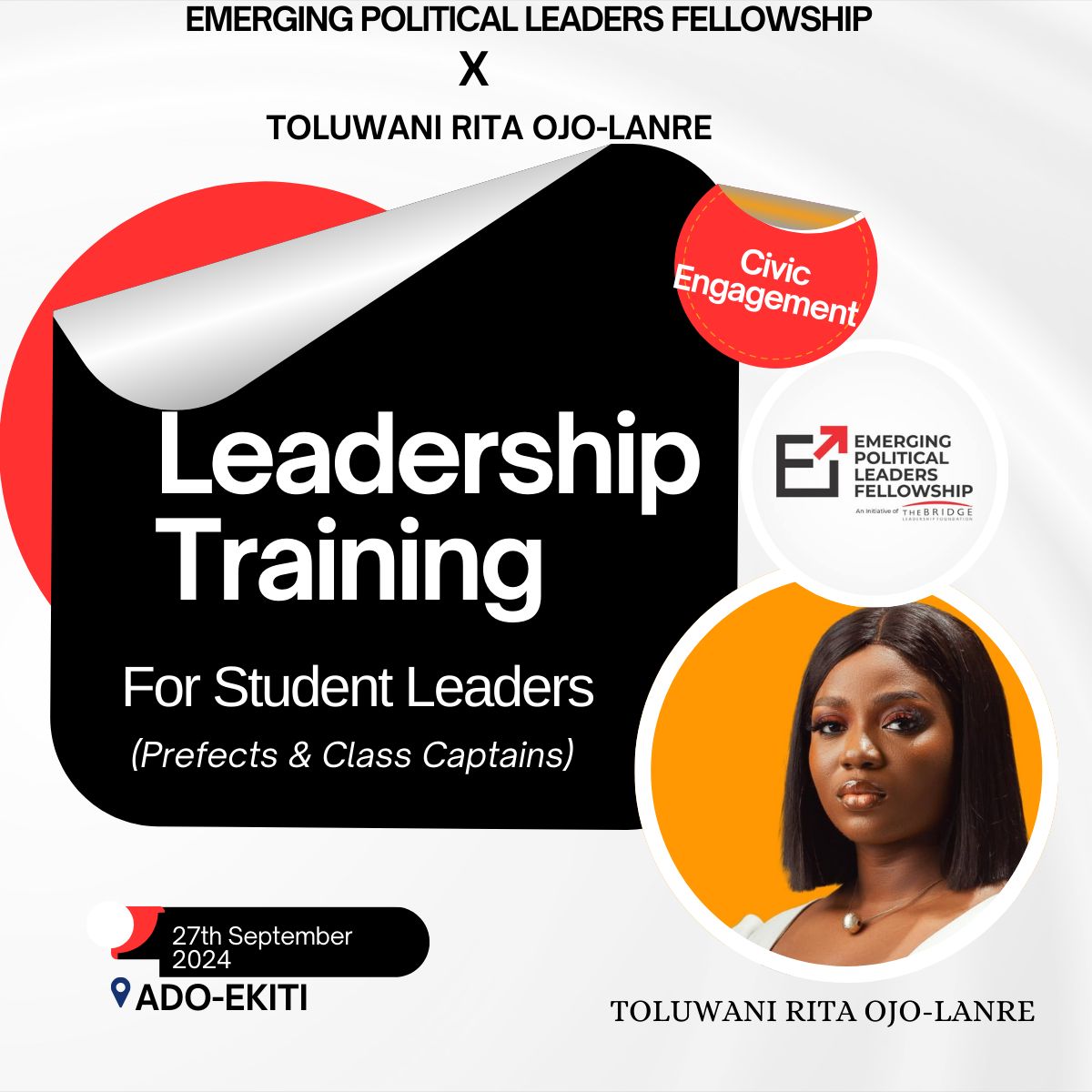To fulfill the Fellowship’s civic engagement pillar, Toluwani Ojo-Lanre conducted her Civic Engagement Activity on September 27, 2024, through the Visionaries Leadership Training. The programme reached 105 participants, including 58 males and 47 females.
Core Objective:
The primary goal of the training was to equip student leaders (prefects) with the essential leadership skills and values they need to be effective in their roles. Student leaders are tasked with maintaining discipline, fostering a positive school culture, and representing their peers. However, many student leaders are thrust into these positions without any formal leadership training, which can result in confusion, inefficiency, and frustration as they navigate their responsibilities.
This lack of training can lead to challenges such as:
- Difficulty maintaining authority and discipline among peers.
- Inadequate understanding of their role and responsibilities.
- Struggles in balancing academic performance with leadership duties.
- Inability to inspire and influence positive change in the school community.
The objective of the training was to address these challenges by providing student leaders with a comprehensive set of tools to help them succeed. The programme focused on leadership principles and practical skills that would not only empower the students to handle their current responsibilities but also prepare them for future leadership opportunities.
By fostering key attributes such as accountability, responsibility, and resilience, the training aimed to nurture well-rounded leaders who can contribute meaningfully to their school’s development and uphold values that transcend the school environment. In the long run, the intention was to help create a culture of strong leadership among students that would have a ripple effect on school governance and community cohesion.
Key Outcome:
The training session was co-facilitated by Toluwani and Iseoluwa Dominic Ojo-Lanre, both of whom used real-life case studies to illustrate the importance of leadership in everyday scenarios. The case studies made the concepts more relatable and tangible for the students, who were able to see how leadership skills could be applied to their own school settings.
Key values such as diligence, accountability, responsibility, and resilience were emphasized throughout the training. Students were encouraged to stay dedicated to their tasks, own up to their mistakes, and strive to maintain high standards of leadership. Additionally, the session projected the students into the future by introducing them to various opportunities they could explore, both within their current roles and as they transition to university.
The session had a long-term focus, seeking to equip student leaders with a mindset of continual growth, ensuring they were prepared for both present and future challenges. By exposing them to a broader understanding of leadership, the session helped the students see their roles not just as prefects in school, but as potential change agents capable of influencing their communities and society at large.
Achievements and Key Highlights:
Toluwani, the host facilitator, brought additional depth to the programme by addressing critical aspects of leadership. Some of the key areas discussed were:
Values of Good Leadership: The students learned that leadership is about serving others, maintaining integrity, and being committed to a greater good. These values are foundational to any leadership role, and the students were encouraged to embody them in their daily interactions.
Responsibilities of Student Leaders: Prefects and student leaders were shown that their role goes beyond enforcing rules. They are also ambassadors of the school’s values and have a responsibility to create a positive environment for their peers.
How to Effect Positive Change: Leadership is about inspiring others to work toward a common goal. The students were taught how to motivate their peers and create a collaborative spirit in the school community.
Paradigm Shifts in Leadership: The training focused on breaking old, rigid ways of thinking about leadership. The students were introduced to modern leadership approaches that emphasize empathy, innovation, and adaptability.
Balancing Leadership with Academics: A major challenge for student leaders is managing their academic workload alongside leadership duties. Practical strategies were discussed to help students maintain high academic performance while also fulfilling their leadership responsibilities.
Benefits and Opportunities for Student Leaders: The students were shown how leadership roles could open doors to new opportunities, both within and outside the academic environment. This included scholarships, networking opportunities, and a better understanding of leadership roles at the university level.
Exploring Leadership Opportunities in University: The training did not just focus on the students’ current roles but also looked ahead to their future. The facilitators highlighted leadership programs, student bodies, and other opportunities that students could explore when they get to the university.
This holistic approach equipped participants with the knowledge and skills to improve school governance and positively impact their school communities.
Way Forward/Recommendations:
The success of the programme has prompted plans to extend the training to over 80 schools by next year, working closely with bodies such as the Ministry of Education. This expanded initiative aims to create a widespread culture of leadership among students in various schools, helping to establish more well-governed and disciplined school environments.
Follow-up/Next Steps:
The initiative doesn’t end with the training. The student leaders are expected to go on courtesy visits to various governmental institutions later in the year. These visits will provide them with the opportunity to meet seasoned leaders who exemplify the qualities they have been taught. These leaders will serve as real-life role models for the students, offering them a broader view of leadership and reinforcing the idea that they are not just “leaders of tomorrow” but active participants in shaping the present.
The students will engage in discussions with government officials, learning from their experiences and gaining valuable insights that will help them apply their leadership skills in a broader societal context. This hands-on experience will deepen their understanding of leadership and provide them with the confidence to take on future leadership roles.

